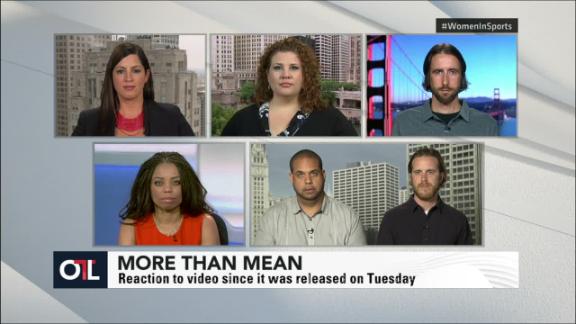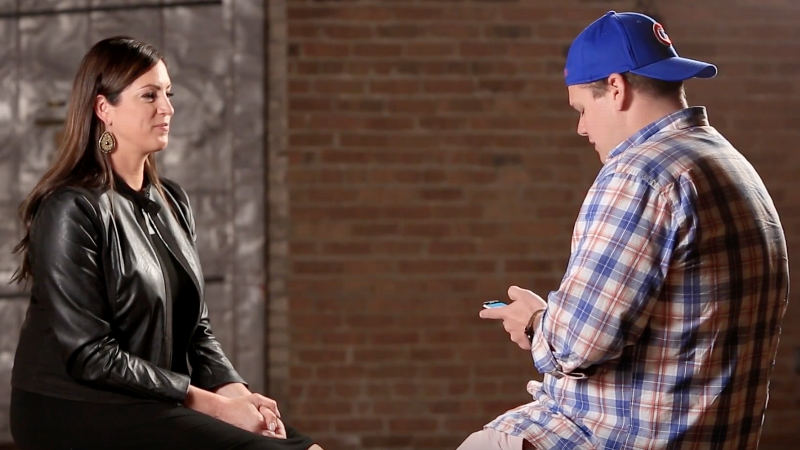Two female sportswriters, Julie DiCaro and Sarah Spain, took part in an on-line video in which a group of men read some of the tweets the women have received in reaction to their work. OTL examines the impact women sports journalists continue to endure. Sarah Spain, Julie DiCaro and Jemele Hill talk about their experiences dealing with online bullying from “trolls.” Sarah Spain joins SportsCenter to talk about the PSA that she and Julie DiCaro did on the offensive tweets female sportswriters receive from male sports fans and how people reading the tweets had a hard time getting through them. Jemele Hill is thankful that Sarah Spain and Julie DiCaro brought attention to the online harassment women in sports media face and says women shouldn’t ever have to accept this treatment.


NEXT VIDEO

Sunday morning, I drove to a loft space in Chicago’s Ukrainian Village neighborhood to film a PSA called “#MoreThanMean” about the harassment of female sports reporters. It was for a project organized by my fiancé’s friend Brad Burke, one of the founders of the Just Not Sports podcast. He asked me and fellow Chicago sportswriter Julie DiCaro to participate in a video wherein everyday guys would read aloud some of the mean tweets I’d received online.
He wanted to use the video to remind people that for those being harassed, this is an everyday issue, not just the outrage du jour every few months when a podcast or website shines a light on it.
Easy enough, I thought. I’ve heard every insult in the book. They hardly faze me anymore.
But the guys tasked with reading the awful tweets, Facebook posts and Reddit comments hadn’t yet seen them and had no idea what they were in for. As they struggled to say the words like “b—-” and “c–t” and read sentiments like, “I hope your boyfriend beats you,” their hands shook, they began to sweat and they squirmed in their seats. Every single one apologized to me after reading the comments, wondering aloud how anyone could possibly think such awful things, never mind type and send them.
I thought I was so hardened to the abuse, after years of expecting and accepting it, that the exercise wouldn’t be too tough. But with every new man who sat down and struggled to get through the words, I felt myself nearing tears. Partly because I really heard the words for the first time when they were said aloud, and partly because I wanted to hug these men, these strangers who were so uncomfortable, and sad, and broken up about the awful things they were being asked to put out into the world. These awful things they were being asked to say right to my face.
“I’m having trouble looking at you when I’m saying these things,” one man said to me. And I was having trouble looking at him while he said them.
Usually when I see a threat or insult online, I simply block the user and move on. I don’t share it, I don’t respond to it and I don’t give it much thought. After years of working in the sports industry, I’ve grown accustomed to being insulted and threatened for something as simple as an opinion on a player or a game. But sometimes, if I’m feeling feisty, or angry, or bored, or sick and tired of reading this stuff over and over again, I’ll respond.
I’ll retweet the comment, fire back something defending myself or chastising the awful words directed at me. And almost without fail, a handful of people will tweet back at me, telling me, “Don’t feed the trolls” or “Ignore it.” The worst of the bunch suggest that women who don’t like the harassment should quit their jobs if they’re not willing to endure the abuse.
While I understand that it’s best not to give online harassers the attention they so desperately crave, it’s difficult to ask women being regularly harassed to internalize the hate and venom spewed at them. Instead of bemoaning a world in which it’s OK to tell someone to “get raped,” our culture demands that the victims of the abuse take it in, digest it, own it and say nothing.
We ask that they “ignore it” as their timeline fills up with anger, sometimes preventing them from engaging in conversation with co-workers and peers, sometimes discouraging them from sharing opinions or speaking truths about controversial issues.
Social media — Twitter, specifically — is at once the world’s biggest sports bar, a hub for sharing ideas, thoughts and debate. As a sports reporter, it’s a place to find breaking news, share links to stories you’ve written, watch games as a community and debate larger issues. You wouldn’t defend someone calling a woman at the bar something repulsive, and you wouldn’t defend an employee threatening the life of a co-worker at the office. So why is harassment on Twitter something that must simply be accepted?
It’s an issue faced not just by female sports reporters. Women in other male-dominated industries, such as tech and gaming, deal with this abuse as well. And men — celebrities, athletes and those in the media — are bombarded with harassment as well. But while the experience isn’t unique to women in the sports industry, the extent of the abuse and type of abuse seem to be different. Anger usually isn’t a result of the opinions you’re giving or the words you’re saying, as it usually is with male reporters. Instead, insults are personal, often about a woman’s weight or appearance, her sexual history or femininity.
Threats mirror the violence perpetrated against women in real life, inspired by misogyny and deep-seated anger rather than a mere frustration with a sports take.
While I’m tough enough not to let the words of strangers derail my career or intimidate me into not speaking my mind, if I’m being honest, the fear of a deluge of abuse has prevented me from tweeting things at times. Sometimes I’m just not up for the exhausting task of wading through insults and hatred. I understand that a certain amount of stupidity, anger and frustration will always exist on the internet, where anonymity allows “tough guys” to spout off without repercussion, but I refuse to simply accept a world in which constant harassment is the norm.
I know that a PSA isn’t going to stop all online harassment, but I do hope that continued conversation will persuade those on the margins, who might consider anger as their only tool, to consider real conversation and discussion when they disagree.
I hope that continued conversation will inspire Twitter and other platforms to look into ways to regulate hate speech and threats. It’s in their best interest to maximize the best elements of their platform and minimize the worst. I hope the continued conversation will cause parents and teachers to open up a dialogue about misogyny, fear of those who challenge the status quo and acceptance of a diversity of voices.
I won’t quit delivering my thoughts and opinions simply because there are sad, unfulfilled, angry, misogynistic, jealous people in the world. I will, instead, pity them, knowing that their lives must be terribly unsatisfying if they feel compelled to attack strangers with unwarranted vitriol. They must be deeply unhappy if they can so easily shed their humanity and aim to damage women like me.
I feel sad for them. I want to hug them and tell them it’s fine. That I’ll be fine. That it’s them I worry about.





